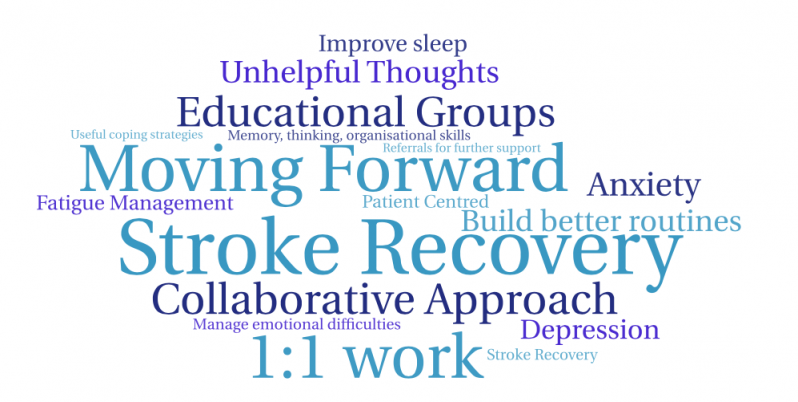Stroke Wellbeing Service
Who are we and what do we do?
Our team consists of a Neuropsychologist, a Psychological Therapist, a Wellbeing Activator, and Living Well Coaches.
We work closely with the staff on the Hyperacute Stroke Unit; local wards; and in the Early Supported Stroke Discharge Teams in the community, to offer therapy, support and advice to patients in the very early stages of recovery after stroke.
Click on the drop downs below to find out more about individual roles of the staff in our team.
Neuropsychologist
Our Neuropsychologist can do assessments to assess any changes in thinking (cognitive) skills after stroke, and help you and the team find the best strategies for managing these.
Psychological Therapist
Our psychological therapist will assess your emotional care needs and can offer you talking therapy to help you understand and manage your emotions, and how they may be linked to your stroke. Our psychological therapist may use a variety of different types of therapy including:
-Cognitive Behavioural Therapy
-Interpersonal Therapy
-Acceptance and Commitment Therapy
Wellbeing Activator
Our Wellbeing Activator will help assess which pathway of treatment will be most beneficial for you, and may offer you some group sessions where you can build knowledge and coping strategies as well as share experience with other people who have experienced stroke.
Living Well Coach
Our Living Well coaches will work with you on a one-to-one basis, to work through any issues that are holding you back in your day to day life. They will introduce you to useful coping strategies and help you practice them.
What do we do?
Rates of depression and anxiety are high after strokes, and recovery is often made harder by changes in thinking skills such as memory and problem solving abilities that the person would usually draw on to help them adapt to change.
We offer advice, and support you to practice useful coping strategies to help you manage difficulties you are facing in your daily life. Below, are a few of the things we can help support you with:
-Managing unhelpful thoughts
-Building better routines
-Helping you to sleep better
-Managing stress, anxiety, or low mood
-Help you to understand and manage fatigue
-Improve memory, thinking and organisational skills
What to expect if you come to see us?
The new service aims to offer assessments to every patient admitted to a hospital within North Cumbria as a result of a stroke. You will have the opportunity to have your mood and cognitive skills assessed and to discuss any worry developing as a result of your stroke. This will usually happen on the Hyper Acute Stroke Unit, within hours or days of you coming into the hospital.
Our team will then be able to advise a pathway of treatment to enhance your recovery, this might include some psychological therapy input, some one-to-one sessions with one of our Living Well Coaches, or the opportunity to participate in some educational group sessions with others who may have had a similar experience to you.
Your input to your own therapy and recovery is as important as ours. It is a process which will require your commitment along with your time, to help you get the most from your treatment.
We usually work with people for around 6 weeks after their stroke. This work will usually start straight away and we will work with you during your time in the hospital. We will review with you when you are due to go home to see if there is any further help we can offer and we will often continue to work with people as they adapt back into their home environment.
When we come to the end of our treatment, we will make recommendations on what you can continue to do to improve your wellbeing after stroke. This might involve offering additional strategies, referral to another organisation such as the Stroke Association or giving you written information about the work we have done together.
Confidentiality
Details of your sessions are put on your medical record, but you can tell us if you do not feel ok with anything being shared with your GP or other members of your care team.
We will only talk about you outside the team when you give permission, or if we think you are at risk of harm and we need to protect you or others.
We will keep your GP and/ or consultant up to date by sending letters about your appointments so they know how you are and what you are currently working on – you will also get a copy of these letters.
Why this approach?
It allows us to support you with your individual needs, and work with you to best manage your difficulties. This approach can be adapted to what you are experiencing at any one time, and what will help you the most. We hope that by working together and making decisions jointly, we will allow you to feel supported and in control throughout - this is guided by information from the National Institute for Health and Care Excellence .
What do our patients say?
Please click here to see more general patient feedback.
Please also see the Neuropsychology Self Help Resources
Newsletters
Please see our newsletters below which give more information about our service and the work we have been doing, as well as some educational articles on stroke related topics and information about other useful resources.

